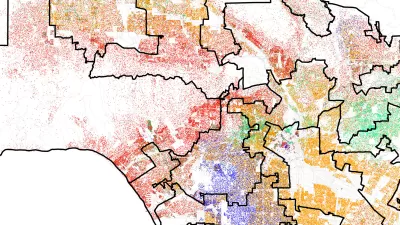A new study by PolicyLink and the University of Southern California's Program for Environmental and Regional Equity showed that U.S. GDP would expand by $2.1 trillion if racial minorities had equal access to opportunities within the job market.
Janie Boschma of the National Journal discusses the findings of a new report, "The Equity Solution," co-authored by PolicyLink and the University of Southern California. The report examines 150 major metropolitan areas within 50 states, each potentially gaining millions in additional annual revenue if residents of color were on equal footing as white residents in terms of average wages. The report also discusses each metropolitan area’s "root cause of racial inequality—how much of the income gap is attributable to a disparity in wages and how much to unemployment and underemployment.
For example, inequality in Santa Barbara, Calif., is mostly driven by a disparity in wages and could be addressed by raising wages or introducing more better-paying jobs. On the other side of the spectrum is Flint, Mich., where inequality is entirely caused by disparities in employment."
To alleviate these often expensive and deep-rooted social issues, the report’s authors "recommend several lower-cost legislative solutions, such as removing questions about criminal history on job applications, as well as enacting comprehensive immigration reform. But they acknowledge that more costly, high-return investments in public education and job training, as well as enforcement of civil-rights laws, would be necessary in order to make real progress in closing the racial income gap."
To inform individuals on data within their city and state, PolicyLink has also released their online visualization tool, the National Equity Atlas. In addition to providing average citizens knowledge on racial inequality in their home, PolicyLink hopes it will inspire action from government and community leaders.
FULL STORY: Eliminating Racial Income Gaps Would Boost GDP By $2.1 Trillion

Planetizen Federal Action Tracker
A weekly monitor of how Trump’s orders and actions are impacting planners and planning in America.

Maui's Vacation Rental Debate Turns Ugly
Verbal attacks, misinformation campaigns and fistfights plague a high-stakes debate to convert thousands of vacation rentals into long-term housing.

San Francisco Suspends Traffic Calming Amidst Record Deaths
Citing “a challenging fiscal landscape,” the city will cease the program on the heels of 42 traffic deaths, including 24 pedestrians.

Defunct Pittsburgh Power Plant to Become Residential Tower
A decommissioned steam heat plant will be redeveloped into almost 100 affordable housing units.

Trump Prompts Restructuring of Transportation Research Board in “Unprecedented Overreach”
The TRB has eliminated more than half of its committees including those focused on climate, equity, and cities.

Amtrak Rolls Out New Orleans to Alabama “Mardi Gras” Train
The new service will operate morning and evening departures between Mobile and New Orleans.
Urban Design for Planners 1: Software Tools
This six-course series explores essential urban design concepts using open source software and equips planners with the tools they need to participate fully in the urban design process.
Planning for Universal Design
Learn the tools for implementing Universal Design in planning regulations.
Heyer Gruel & Associates PA
JM Goldson LLC
Custer County Colorado
City of Camden Redevelopment Agency
City of Astoria
Transportation Research & Education Center (TREC) at Portland State University
Jefferson Parish Government
Camden Redevelopment Agency
City of Claremont




























